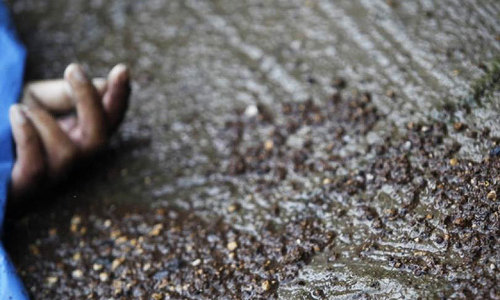A NUMBER OF women have been murdered in the past few weeks in Pakistan. Almost all incidents have been reported by newspapers, TV channels, and rights activists on social media. The question is: why has Pakistani society normalised the physical and verbal abuse of women? If we view crimes against women through the gender lens, we see men — most with social and economic power — committing these acts. A vast majority of men, and in some cases women as well, normalise verbal and even physical violence against women.
A lot has been written on gender-based violence in the country. Many rights NGOs are working to protect women. The federal and provincial governments have established special commissions on the status of women and provincial administrative departments. ‘Gender equity’ has become a development slogan. Special seats have been reserved for women in the national and provincial assemblies. ‘Financial inclusion’ echoes everywhere. There are media campaigns focusing on women. And yet we see women being treated as lesser beings in social and financial affairs, especially in villages and underserved urban slums. There must be something seriously wrong that we — as a society — have been doing to our women.
The problem starts with the birth of a girl. Even today, this event is implicitly or explicitly mourned by society. In some cases, condolences are offered to the mother of the newborn who is also held responsible for giving birth to a girl. In fact, there are countless mothers who have been subjected to violence, even murdered, for producing a girl child, a trend that is likely to persist.
The Pakistani state, at all levels, needs to be inclusive of women.
The patriarchal structure of our society degrades merit and promotes men against women which further strengthens male dominance. Women are discriminated at home, and often, parents play a part in this — encouraging their sons to assert power and authority over their daughters. This unearned privilege provides these boys (and later men) a sense of so-called superiority over women. This is where the problem lies. These men then treat women as their subordinates and want to practise the same at home, in the family, at markets, in the police station, and even in courts, in fact whatever relationship they may have with the women.
The barbaric murder of Noor Mukaddam in Islamabad; the beating to death of Quratul Ain, a mother of four, by her husband in Hyderabad; the murder of four women — wife, two daughters and an aunt — in district Shikarpur; Shahnila Machhi’s homicide in Jamshoro, the burning to death of 30-year-old Umbreen in district Tando Jam, and so many other reported and unreported incidents of violence are motivated by this misogynistic sense of entitlement in men.
Women are killed in the name of honour even when they do not know how many females live next door. In the rural and tribal parts of the country, the fate of the female victim is decided by men-only local jirgas — again an indication of how a woman is considered the property of her father, husband or brother. The men assert control to be recognised as the authoritative figure in the family and by extension the society. In fact, their entire ‘power’ emanates from their control over women, in whatever role. And the few who accept women as equals and welcome their independence are shamed by their fellowmen, and painted as un-masculine.
Read: No woman’s land
Raising questions about a woman’s character, and then killing her gives an easy escape to murderers. A male-centric society tries to give validity to such murder by calling it ‘honour’ killing.
The much-debated Single National Curriculum should have made a deliberate effort to address the disrespect towards women and the propensity to condone violence against them. Although the SNC aims to create national harmony, it fails to address grave social injustices in the revised curriculum. It does not see gender equity as a moral and societal obligation.
The Pakistani state, at all levels, needs to be inclusive of women. State institutions should systematically make space for women and bring them at par with their male counterparts. And this inclusiveness debate needs to come out of the five-star hotel workshops and discussions. Women should be seen in public spaces and government offices as much as we see men. And men should be seen inside their homes doing chores that are typically expected only of women. This would be a step towards raising future generations of men in an environment that is free of gender-based violence. The sexist degradation of women through so-called comedy shows, jokes, TV serials, and literature needs to end for good.
The writer is a co-author of Agents of Change and The Economy of Modern Sindh.
Published in Dawn, August 7th, 2021















































